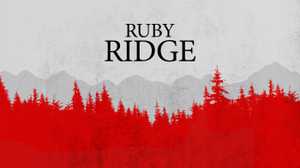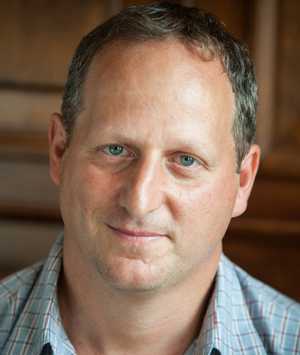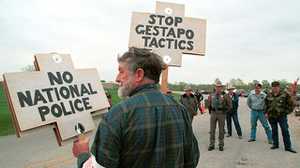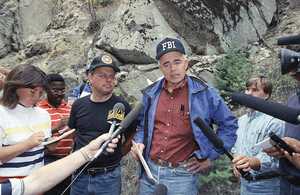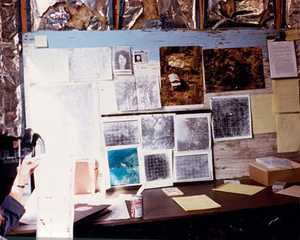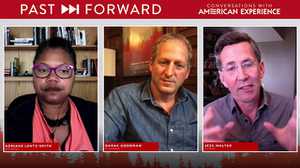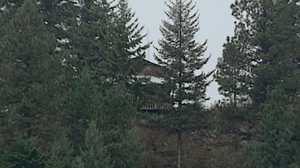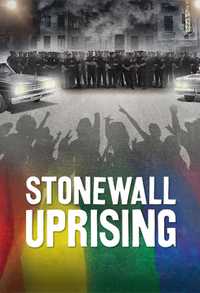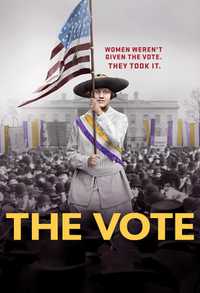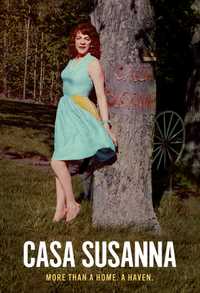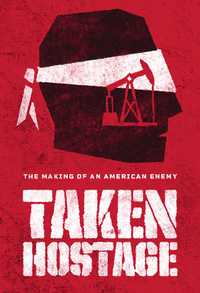Bill Morlin, Journalist: At the time, it was all shrouded in secrecy. But there were meetings at the highest of levels, clear back to Washington, DC, like how can we effect the arrest of this man? Some people, I later found out, were actually advocating a front-on tactical assault. To go up there with armored personnel carriers and, you know, whatever kind of armament they needed and just shoot it out with him!
Dave Hunt, U.S. Marshal: I told Randy, I said, “You don’t really understand what the full weight and power of this government is, and what it would really mean if you want a confrontation with it. I think I used the term that it’s like a locomotive. Once you get it rolling down the tracks, it’s hard to stop.
Archival Sot: Protesters: … murderers! Fucking murderers!
Archival Sot: Protesters: …proud of yourself? You sons of bitches!...
Archival Sot: Protesters: You call yourself an American? These are Americans! These are God-fearing people! You don’t even know your Constitution. Go back and read what your founding fathers say!
Sara Weaver, Daughter: We were taught from a very early age to never point a gun at anything you don’t plan on shooting. Dad was very, very strict about that. Guns were tools, in our family. They were there for protection from wild animals, or to hunt game. Guns were there for a purpose.
Bill Morlin, Journalist: This is North Idaho, 1992. 50 miles or so from the Canadian border. Here’s a man with his family, armed to the teeth…who knew that a federal judge wanted him to come to court, and he was refusing to do that. And he lived with the consequences.
Sara Weaver, Daughter: When Mom and Dad met, Dad was in the Army. He was a Green Beret. It wasn’t until he was home on leave that they actually got together and really started to date and fall in love. I have memories of hot Iowa summers and cold Iowa winters, and Grandma and Grandpa’s farm. I do remember my parents discussing always wanting to move to the mountains. So, you know, they learned about how to raise kids without electricity and things like that. And then I remember they started to sell things and Mom and Dad, you know, just prepared by buying stuff you might need living on top of a mountain somewhere.
Archival Sot: Auctioneer: 85, 75, 85, 85, 85…
Daniel Levitas, Writer: Randy Weaver wanted to move his family from Iowa to Idaho partly because of the Farm Crisis.
Archival Sot: Auctioneer: 85, 75, 85, 85, 85, 85, 85, 85, now 100, 100…
Daniel Levitas, Writer: By the early 1980s, the economy in Iowa had been deteriorating for some time. Fuel and input costs were rising, and farmers were going bankrupt.
Archival Sot: Farmer: You don’t need to sell it. You don’t need to sell it.
Archival Sot: Auctioneer: I’m going to sell it. It’s part of my business, part of my livelihood.
Archival Sot: Farmer: You don’t have to do away with the farmers, sir.
Archival Sot: Auctioneer: I’m not doing away with the farmers.
Archival Sot: Farmer: Stop it! Give the farmer a break!
Jess Walter, Writer: Farmers are losing their family farms, interest rates are 15, 16, 18 percent. Randy’s working at the John Deere factory, afraid that he was going to get fired…And the Weavers, who are starting to explore the idea of Bible prophecy, began to see things that were occurring as being part of the end times, the very thing that the Book of Revelations was promising. And I think those connections were the ones Vicki especially was making.
Sara Weaver, Daughter: My Mom interpreted some of the things in the Bible very literally. There’s a verse in the Old Testament about not having graven images, and so there was a point when the TV, you know, kind of left and my parents started to dig deeper into the Bible. They did believe in an apocalyptic future. And I think that they started to take that more seriously as they got ready to leave Iowa. Fear was--was a big part of it.
Jess Walter, Writer: As they leave Iowa, they’re telling their friends and family that a great conflagration is coming and they must seek a place to be safe. They must go to the west and find a mountaintop. They were really imagining this fortress, this place where they could really separate themselves from a corrupt and dangerous world.
Bill Morlin, Journalist: It was incredibly remote. I mean, they had no electricity, no running water, no indoor plumbing. We’re talking about a cabin, made by Randy Weaver and his wife, on a mountaintop. They thought that they were living on the edge of Armageddon, and this was the sort of sanctuary that Randy and Vicki Weaver wanted.
Sarah Weaver, Daughter: There was definitely work involved, in living that way. Dishes and firewood and hauling water, and doing laundry with a washtub and washboard. I loved to garden so as I got older I kinda took over the gardening. Sam and I, we worked hard, but we enjoyed working and helping Mom and Dad out. You depend on each other for your survival, living that way, so we were all very close. Growing up on the mountain, there was so many things for Sam and I to explore, and learn, and do every single day. I was best friends, you know, with my brother and I think it was good for us. I really do.
Stuart Wright, Writer: I don’t know that Randy Weaver knew at the time that they moved to Ruby Ridge…that they would be so close to the Aryan Nations compound, which was just 60 miles south. But they started showing up. At first it was purely social, they attended family picnics, those kinds of things. But as Randy began to interact more with them, he started to buy into the message.
Archival Sot: Richard Richard Butler, Aryan Nations Founder: We the white race lost the war. A plague known as Jews won the war, infiltrated our bloodstream of our race in every country in which we reside.
Daniel Levitas, Writer: The founding principle of the Aryan Nations was something called Christian Identity theology, which teaches that white Anglo-Saxon Christians are the true descendants of the Lost Tribes of Israel, and that those who call themselves Jews are not merely imposters, but are actually children of the Devil. It also teaches that African Americans and other people of color are sub-human.
Archival Sot: Richard Richard Butler, Aryan Nations Founder: Every major city in the United States is now non-white…following the catastrophic destruction of our race in the so-called Civil War, or the War Between the States. America shall again become white and Christian. There’ll be a lot of blood running one day. I don’t advocate it, I don’t want it, but it’s gonna come, as sure as day follows night and night follows day.
Jess Walter, Writer: The Weavers were on this journey of religious discovery that had led them to isolate themselves and to live in a style they believed was Old Testament Christian. Christian Identity shared some of those tenets, so I think the Weavers saw some kinship in these people. But they also were really clear that they didn’t want to join, that there were things they didn’t believe, that they didn’t agree with. Essentially, for the Weavers, the Aryan Nations was a chance to meet people, and you know, and to make friends.
Sara Weaver, Daughter: Being there as a kid, it was just like a family vacation. I think my Dad took us there out of curiosity. He was always up for a debate, always up for a discussion. Being the inquisitive person that he is, he was like “Sure! I’ll go check it out.”
Bill Morlin, Journalist: Every summer, Richard Richard Butler, Aryan Nations Founder: would host a gathering called the Aryan World Congress, which would attract fellow racists from all over the country.
Archival Sot: “What do we need? White Power! What do we need? White Power!”
Bill Morlin, Journalist: Some of these people were Christian Identity, some of them were Ku Klux Klan, there were outlaw bikers there, and skinheads and other neo-Nazis that were atheists. But their common denominator was their belief that the white race was the supreme race, and many of them wanted to basically declare war on the US.
Jim Botting, FBI Negotiator: Some people who spent time up with Richard Butler, Aryan Nations Founder: up at Hayden Lake would then go off in these splinter groups that became threats in their own way…But they were very violent, very anti-government, heavily armed, so the Aryan Nations was a cause for concern for those of us in law enforcement.
Bill Morlin, Journalist: Starting in the mid 80s, the feds wanted to know who’s there, and what are they doing, and what are they planning on doing next? So by the time Randy Weaver started showing up at the compound, the Feds were listening.
Daniel Levitas, Writer: They had lots of events there designed to potentially recruit harder-core folks into the Aryan Nations, and it was at one of those meetings that Randy Weaver was spotted by an undercover federal informant.
Bill Morlin, Journalist: This guy got next to Randy Weaver and learned that he was clearly a racist. That he wanted to live his white separatist lifestyle in north Idaho, but that he was having trouble putting two nickels together and that he was interested in some income, and one thing led to another, and pretty soon, Randy Weaver agrees to saw off some shotguns.
Jess Walter, Writer: Everything shifts when Randy Weaver saws the barrels off those shotguns. He had now committed a federal crime. But it’s so clear that Randy Weaver was not a guy up there sawing the barrels off shotguns and selling them. He only committed this act after talking to an ATF informant. But then the idea is, we can turn this guy.
Bill Morlin, Journalist: There’s nothing unusual about that. It’s the way the federal criminal justice system works. If they can take the information from, you know, suspect number one and lead them to suspects number two through ten, that’s what they’re going to do. They do that all the time.
Chuck Peterson, Defense Attorney: Here’s the government, and they come to you and they say, “We’ve been watching you. We know that you sold a sawed-off shotgun. Now, if you won’t work for us, if you won’t help us to get inside the Aryan Nations and to get inside the white separatist movement, if you won’t do those things for us, then we’re going to arrest you, and we’re going to place you in jail, and we’re going to take away your property.” And Randy Weaver said, “No.”
Sara Weaver, Daughter: A couple posed with a broken down truck on the road near our house, and as Mom and Dad stopped to help them, they were thrown on their faces in the snow and frisked, and Dad was, you know, hauled off to jail.
January, 1991
Sara Weaver, Daughter: He had to post our home as bond and he told us “You know, if I lose my trial we lose our home.” And he’s like, “How am I going to win this?
Bill Morlin, Journalist: These are people that want to be left alone. And Randy’s arrest just galvanized the Weaver’s hatred of the federal government. They really thought the government was evil. Vicki wrote two letters to the U.S. Attorney for Idaho, which she addressed to the Servants of the Queen of Babylon.
Jess Walter, Writer: The Queen of Babylon. This is very much the language that was coming out of the Aryan Nations. This language of a coming war, with the Anglo-Saxon armies defeating the tyrant that was the federal government. She believed not only that we were living in the end times but that she was being given signs and she was defiant.
Sara Weaver, Daughter: I think she was at the end of her rope, I really do. And I think for Mom and Dad it was, “We’re not going to take anymore.” You know, getting thrown in the snow and sent to jail and if you lose your case you lose your house. They had to have been an emotional mess.
Jess Walter, Writer: And then, Randy doesn’t show up for trial. What happened next was the brutality of bureaucracy. One agency leads to another agency. So the case becomes the responsibility of the US Marshals Service.
Dave Hunt, U.S. Marshal: Our job was to bring him before the court to answer charges, and that’s all it is. It doesn’t even necessarily mean he’s guilty of anything. Our first step was to do a threat assessment. He didn’t appear like he going to run or abscond in some way. He had roots to the community. He had a family there. And I thought that time was on our side. But that threat assessment also showed that he was extremely committed to his cause. And that’s what made that situation a little more dangerous.
Jess Walter, Writer: The threat assessment portrayed Randy Weaver as a former Special Forces Green Beret who may have booby-trapped his house, living with a woman who would kill her own children rather than surrender. It was either worst-case scenario or fanciful, but the assessment of the Weavers made them look more like criminals and less like a family.
Sara Weaver, Daughter: My parents decided that they would just stay up on the mountain until the legal aspect got figured out. And so, all through the summer and winter, we didn’t go anywhere anymore. We stayed up there. And the winters could get long. You know, Sam and Rachel and I sometimes we’d read two books in a day. We would play card games and Monopoly and Yahtzee and Scrabble, you know, all of those sorts of things in the long evenings. We had friends who would come see us who were concerned about the situation, who were concerned about us, you know. They’d bring us food and supplies and things. And my mom had my little sister up there during that time. And I think about that, I’m just like, wow, that took a lot of courage on both their parts.
Dave Hunt, U.S. Marshal: Winters are tough up there. And during that time, I learned a lot about Randy. I must have interviewed several dozen people, neighbors, friends and family, and I’d asked the question: why don’t I just go up there and talk to him and tell him he’s under arrest? And everyone said that would be the worst thing you could do. That he is committed and that Vicky is as committed as he is.
Jess Walter, Writer: During this time, the media caught wind of the fact that this family of white separatists had been hiding out for over a year, and had vowed not to be taken alive.
Bill Morlin, Journalist: We published a story in early March of 1992 saying ‘Feds have fugitive under our nose’. In that story, I quoted officials as saying that, “We don’t want to go up there and get in a gun battle with kids.” But the marshals are stuck with a federal judge’s order saying, “Go get this man. We’re a country of laws. Bring him to justice”.
Sara Weaver, Daughter: It was probably an embarrassing thing for the government because here’s this guy on the mountain who they think is flipping the bird to them, and, you know, they need to deal with it because it’s making them look bad.
Bill Morlin, Journalist: And so the Marshals intensified it and decided to have motion-activated cameras placed near the Weaver cabin so they could figure out how many people are there, who’s carrying guns, and what are our options in terms of effecting an arrest? The tapes showed that Randy Weaver was there with his wife, and his children, and a man named Kevin Harris, and that they frequently were armed. They have to have been shaking their heads. What are we going to do? And then, in May of 1992, Randy did an interview, and he said, “I don’t care what you do, I’m not coming off my mountaintop.”
Jim Botting, FBI Negotiator: The longer a situation goes on, the more frustrating it becomes. So, the marshals brought in their special surveillance team, and they skunked around the area, trying to find a location to take Randy Weaver into custody without a problem. But they’ve got a guy heavily armed, reportedly heavily armed. He’s barricaded in a cabin. He’s got his family in there with him, I mean, they just didn’t know what to do with this guy.
Archival Sot: Marshal 1: Well, this is the approach from the east… how far you figure?
Archival Sot: Marshal 2: 100 meters.
Archival Sot: Marshal 1: 100 meters?
Sara Weaver, Daughter: At times I had the feeling we were being watched. It was really hard to trust anybody at that point, even our friends that came to see us. I mean, there was always that, ‘oh, is this person maybe working for the government’, or ‘is this person maybe…’ you know what I mean? It was just —it was all pretty unsettling.
Dave Hunt, U.S. Marshal: On the morning of the 21st of August, 1992, we approached the mountain with two teams, six people. We followed the south trail. It was a logging trail that lead to the Y area and there we split, our two teams split.
Archival Sot: Marshal: At the first fork in the road, we took a left, up a steep hill.
Dave Hunt, U.S. Marshal: I took my surveillance team further up the mountain, above Weaver’s place, to a vantage point where we could observe what was going on. That particular day was nothing but to gain updated intelligence and see if they are still performing and doing their normal routines. Has anything changed? And to familiarize the other deputies with the mountain. I briefed them on various trails on the mountain, and where we were gonna go to set up an outpost. The other three deputies were down below, closer to the house, when the dog starts barking.
Archival Sot: Barking.
Dave Hunt, U.S. Marshal: I was hoping that he would stop barking. But the dog gets more intense in its barking and at that time I realized ‘oh crap, he’s on their trail’.
Archival Sot: Barking.
Sara Weaver, Daughter: Sam and Dad and Kevin were like, “Well, let’s go check it out.” I felt slightly torn at that moment, do I follow them or do I go home? And I was like, oh, they’ll be fine. I’ll just go home.
Dave Hunt, U.S. Marshal: And it wasn’t within a minute or two, that I first hear the first shot.
Archival Sot: Gunshot.
Dave Hunt, U.S. Marshal: A second or two later, I heard a second shot.
Archival Sot: Gunshot.
Dave Hunt, U.S. Marshal: And then in quicker succession more shots and probably as many as, I don’t know, 20 rounds being fired at that point.
Sara Weaver, Daughter: I heard gunshots. And then I heard more gunshots, and so I started to get worried.
Dave Hunt, U.S. Marshal: I get a radio call that says, “Dave, Billy’s been hit.” Billy Degan. I grabbed my guys, I said. “Let’s go.” We headed in down a trail that would take us towards the Y, and we find Billy down there. Frank goes to work on him to try and help him and he just looks up and we know from the look in his eye that Billy is gone. How’d it happen, you know? What happened there?
Jess Walter, Writer: The family’s version is that they’re chasing deer into the woods, and there’s a place where the trails come together in a sort of Y. Kevin Harris and Sammy Weaver are coming down this way, Randy Weaver’s coming down this way. And according to the family at that moment they see some men dressed in fatigues with dark paint, very much like a strike team, and that possibly to silence this dog, which has found their location, one of the marshals shoots and kills the dog. Fourteen year old Samuel Weaver at that moment erupts and says, “You killed my dog, you son of a bitch,” and opens fire. Again, according to the family the marshals then fire back, killing Samuel Weaver. Kevin Harris in the meantime dives for cover, fires on the marshals, and shoots and kills William Degan, a highly decorated US Marshal in the Special Operations Group. Of course the marshals tell a different story. In their version of the telling, as these groups come together on this Y, the marshals identify themselves, and call out a surrender order, and it’s at that moment that Kevin Harris opens fire. And so you have these two incredibly different narratives, the marshals believing they’ve come under attack by white separatists, and the family believing they’ve been attacked by federal agents.
Sara Weaver, Daughter: I saw Dad come walking up the road, and he was visibly upset, and he was by himself, and I knew something was wrong. Then I don’t know how long it was after that. It seemed like a long time, Kevin came walking up the road, and he said, “Sam’s dead.” And then I think Mom’s, I think her mother side kicked in, and she’s like, “I’m going to get him. We got to go get him. I’m not going to leave him there.” And so they started heading down the mountain. And it seemed like forever before they came walking back and I saw them carrying him. He’d been shot once in the elbow and once square in the back. My mom was a mess. I remember her just saying, “I’m going upstairs for a while,” and Dad following her up. We were just a grieving family, like, ‘what the heck just happened?’
Dave Hunt, U.S. Marshal: Right after the shooting, I came down off the mountain, got to a telephone, and contacted US Marshals Headquarters. I briefed them on exactly what’s happened, and that Billy’s dead.
Friday - August 21, 1992 - 11:20 a.m.
Archival Sot: Dave Hunt, U.S. Marshal: This is Dave Hunt, U.S. Marshal:, US Marshal Office.
I have one officer dead. I need help quick.
We’ve had an incident with Randall Weaver.
I want the State Police, I want all the help here I can get.
Bill Morlin, Journalist: When a cop gets shot, cops get pissed off, and in this case it was a federal cop, killed on the property of a white separatist. And of course, the word reaches Washington, DC, and it’s now, you know, in the front drawer.
Jess Walter, Writer: So at this point we have another bureaucratic shift. What started as a Bureau of Alcohol, Tobacco, and Firearms investigation, and then became a Marshals Service fugitive hunt, has now become an FBI case. The FBI begins to scramble its Hostage Rescue Team.
Archival Sot: Explosion.
Jim Botting, FBI Negotiator: The HRT was the super-SWAT of the FBI. It was designed to handle incidents that went beyond the capabilities of a local SWAT team. And Randy Weaver was reported to be an anti-government, racist, neo-Nazi sort of personality, with some connection to Richard Richard Butler, Aryan Nations Founder:, some connection to the Christian Identity movement. In other words, very dangerous.
Jess Walter, Writer: The Hostage Rescue Team believe that they are deploying into an ongoing firefight with a white separatist and his armed family. And because they believe they are going into a firefight, the rationale is given that a surrender warning doesn’t need to be called out, that that warning has already been given by the US Marshals, Deputy Marshals on the ground, so agents can open fire as soon as they see any armed adult. Well, the Weavers are always armed.
Chuck Peterson, Defense Attorney: They adopted a military rule of engagement. This is the enemy, you may kill them if they’re armed. And if they have a gun, you can and should use deadly force. That was actually the wording, you can and should use deadly force.
Jess Walter, Writer: The very next day, a team of 10 FBI agents in the Hostage Rescue Team surround the cabin. These are snipers. These are the FBI agents who’ve been trained to hit a dime from 200 meters.
Sara Weaver, Daughter: That morning, we all were just trying to grasp what had happened the night before and at some point Dad said “I’m going to go see Sam one last time.” His body was in the shed. And before I knew it, Dad and Kevin had headed out. So I went after them, and that’s when I heard a gunshot.
Archival Sot: Gunshot sound.
Sara Weaver, Daughter: I ran over to where Dad was, and he was holding himself. And I said, “Dad, what happened?” And he said, “I’ve been shot.” My Mom came out on the front porch and was holding the door open, and she was like, “What happened?” and Dad’s like, “I’ve been shot.” And she started screaming, “Get in the house, get in the house, get in the house!”. So we get to the front porch and I’m pushing Dad through the door, and Mom is right next to me holding baby Elisheba and screaming, “Get in the house, get in the house.” At this point Kevin was coming in behind us, and I hear this giant just, boom.
Archival Sot: Gunshot sound.
Sara Weaver, Daughter: And I felt things hit my face, and Mom dropped next to me. It took me a second to comprehend that Mom had just died, and that it was parts of her that had hit my face. That’s when Dad, he went and picked up Elisheba… and handed her to Rachel, and pulled Mom in the house so we could close the door. Because at that point we were, we were being hunted, that’s how it felt.
Bill Morlin, Journalist: Where we were based at the roadblock, it was out of view of where this was occurring. We were down probably a good two miles or so from where the actual cabin was. Neighbors, friends of Randy Weaver, and reporters from all over the country started gathering there, trying to get information.
Archival Sot: Marshal: If we can tell you something, we will, but most of it will all come out of Washington, D.C. You know, I’m just trying to tell you, the weather’s bad, and we’re not going to come out and make some big statement, so…
Bill Morlin, Journalist: They didn’t let us see first-hand what was going on. But clearly, it was a big deal.
Jess Walter, Writer: One of the things as a reporter that I reflect upon is the way we began reporting this story. Federal law enforcement only had one version of what was happening and that was the way we covered the story. These are white supremacists, they are causing some trouble, there’s a shootout with federal law enforcement. And the way information came out, you know, especially in the beginning, that-- that was the narrative. And then the FBI discovers Samuel Weaver’s body, in the shed where Samuel had been taken by the family. And the story begins to shift a little bit.
Archival Sot: Protester: You f***ing bastards! Are you proud of yourself? Are you proud of yourself? You’re going to kill all the children to get one man if it takes 800 of you. You’re going to have nightmares about this! You’re going to burn in hell—
Archival Sot: Other Protester: Right here, right here! Come on! Baby killers, baby killers, baby killers. Smile! Smile!
Jim Botting, FBI Negotiator: When we arrived on Sunday evening, we went through a group of demonstrators right at the bridge that were yelling and screaming, and we drove off that and then in about a mile, and then they had a big open field with tents, and trucks, and helicopters. It looked like a real military base. I was working with the FBI’s Crisis Negotiation Team. We were called in because the Hostage Rescue Team had not been successful in communicating with Randy. They had been bull-horning Randy in the cabin, but Randy had not responded to them. And they hadn’t been able to get in a hostage phone. He had no phone in the cabin itself, so HRT had just simply been yelling at the cabin.
Bill Morlin, Journalist: This was all going on behind a cloak of secrecy. I mean the FBI is a secret agency and the public doesn’t need to know everything they do, but this was government in the dark.
Archival Sot: Gene Glenn, FBI Special Agent In Charge: If we can have your attention for a few moments we can give you an update.
Bill Morlin, Journalist: Once a day or so, the special agent in charge would come down and hold a, you know, a pretty feeble press conference.
Archival Sot: Reporter: Do you consider this an overkill? To get two people? All these people?
Archival Sot: Gene Glenn, FBI Special Agent In Charge: No I don’t. I don’t at all. This is a complicated situation because in the residence there are juveniles. That’s a critical factor that sometimes in our busy society we tend to overlook. That’s a critical factor. And in our society, we place a high value on a human life.
Jess Walter, Writer: At this point, they don’t know Vicki Weaver’s dead. The hostage negotiators would begin every morning by saying, “Vicki, send the children out. We’re having pancakes. Vicki, why won’t you come talk to us? You know, we won’t harm you.” Inside the cabin where Vicki’s lying dead, the family believes they’re taunting them.
Sara Weaver, Daughter: My dad, he lost it. And he started to yell at them, and I wanted him to stay quiet. I was scared to death that they would find out his location and just open up on him. But he’s like, “You shot my wife, you cowardly SOBs.”
Jim Botting, FBI Negotiator: The negotiations were addressed to Vicki, because we thought she was very influential towards Randy, and we thought that she was very strong as a personality and that she would be very helpful. Little did we know that she had been killed, and that she was, I mean, he was incredibly offended by any mention of his wife, who’s laying in the kitchen. It was awful, I mean, it was awful!
Dave Hunt, U.S. Marshal: In his mind, we had proven everything that he felt and believed and been taught to believe about the federal government was true and that it was coming true piece by piece.
Archival Sot: Protesters: Hey Pastor, hey pastor.
Bill Morlin, Journalist: Ruby Ridge became a huge propaganda opportunity for people like Richard Richard Butler, Aryan Nations Founder: who wanted to galvanize anti-government hatred.
Archival Sot: Protester: You’re a disgrace to the white race! Disgrace to the race!
Bill Morlin, Journalist: But they all had their own agendas. Some of them were religious based. Some of them were neo-Nazi. At one point, a group of skinheads, and I was in the front row to see this, attempted to smuggle in a bunch of weapons and guns in to Weaver hoping they could somehow assist him.
Jess Walter, Writer: It felt very much like there might be more violence. The FBI is trying everything to find a peaceful solution.
Archival Sot: Gene Glenn, FBI Special Agent In Charge: We are taking every step we possibly can to, through the use of the phone, effect a surrender.
Jess Walter, Writer: I remember listening to Paul Harvey and hearing him appeal to Randy on his radio program.
Archival Sot: Harvey: A telephone has been left right outside your door, on your porch. Reach out and pick it up. Nobody will shoot. Your family wants to know what to do with Samuel’s body and also I will arrange for an attorney in Spokane to represent you in the death of Deputy Degan with a plea of self-defense. Consider your options. I’m offering you a chance to resume the isolation you prefer with your family, if you will just reach out and pull in, and talk into, that portable telephone.
Sara Weaver, Daughter: We heard it on the radio when Paul Harvey had a message for my Dad.
Archival Sot: Harvey: I am talking to you, personally.
Sara Weaver, Daughter: But we didn’t trust anybody for any kind of help, for anything. And I think it made me angry more than anything at the misinformation that we heard. I would cringe every time the media portrayed my Dad as this wild man in the woods that the Feds needed to take out.
Archival Sot: Radio: … Randy Weaver sits in his mountaintop cabin… One man’s stand against the law is suddenly taking on the appearance of a full-blown war.
Sara Weaver, Daughter: We didn’t feel at that point very confident that we were going to be allowed to share our side of the story. We weren’t even confident we were going to make it out alive.
Jess Walter, Writer: By this time I had contacted Randy and Vicki’s families in Iowa, I had tracked them down, and they were telling another story, not of white separatists bent on a race war but on a family that took to the woods because they believed the end of the world was going to come. And that I think was the first time that the media started to shift the narrative a little bit. And, at the same time, the FBI is realizing that this is not the situation that they thought they were coming into.
Archival Sot: Reporter 1: Is there any progress?
Archival Sot: Gene Glenn, FBI Special Agent In Charge: We can’t comment on anything of that nature.
Archival Sot: Reporter 2: Have you talked to him, though?
Archival Sot: Gene Glenn, FBI Special Agent In Charge: I didn’t say that.
Archival Sot: Reporter 3: He has been in contact with you then?
Archival Sot: Gene Glenn, FBI Special Agent In Charge: I didn’t say that.
Archival Sot: Reporter 4: How many men do you have?
Archival Sot: Gene Glenn, FBI Special Agent In Charge: I won’t comment. We have sufficient resources to accomplish the task.
Bill Morlin, Journalist: The FBI didn't have many options. They were at wit’s end; I don’t think they knew what to do. They’d reached out to Vicki Weaver’s sister and other family members and he wouldn’t respond. But clearly, they weren’t going to pack up and go home. I mean they’ve got 400 federal agents on the payroll up there. And they’ve got the national media watching this.
Archival Sot: Peter Jennings: A standoff between a man who is wanted by the FBI and a large number of federal agents. It’s entered its 6th day. The man has been holed up in a cabin in a remote section of Idaho with his wife, 3 daughters, and a friend.
Sara Weaver, Daughter: My mom was on the floor, dead. It was torture. But I didn’t want to come out. I was scared to death of the door opening — I mean, they had proven that they were there to shoot at us. So them begging us to come out was like begging us to walk to our death, in my mind. And I think Dad felt that way too.
Jim Botting, FBI Negotiator: When a suspect doesn’t talk to you, that’s a very negative situation. We were government negotiators, and Randy Weaver hated the government. That was going to be very difficult for us to overcome. And so we realized that Randy was going to need a third-party negotiator. It was like, we got to find somebody that he trusts that can speak on our behalf and represent us, but we just didn’t know who that was going to be, until uh, Bo arrived.
Archival Sot: Demonstrator: What’s the word, Bo?
Archival Sot: James "Bo" Gritz: The word is very encouraging, I think. I was assured this, that they have every intention of treating Randy and Kevin with utmost human dignity. Now that is encouraging, because normally you get this 1 digit IQ federal government mindset, and I was very very encouraged by it. I think we’re going to get a chance.
Jess Walter, Writer: Bo Gritz was a hero to the radical right. Some people said he was the model for Rambo. He was a third party candidate for president that year, and made his way to Ruby Ridge hoping that he could negotiate an end to the standoff. I think the FBI was desperate at this point.
Archival Sot: James "Bo" Gritz: I have been maybe-ly overly optimistic. Not about Randy, but about agent-in-charge Glenn. He has been so cooperative it’s as if Washington was on holiday.
Jim Botting, FBI Negotiator: He’s affiliated with this Christian Identity movement, he’s a former Green Beret, he’s a big personality, and he said, “I can help because Randy and I are both Green Berets.” So, on Friday afternoon, and this thing now is in the eighth day, HRT brings Bo Gritz up in a Jeep.
James "Bo" Gritz: So I was maybe 20 steps from the cabin. And I said, “Randy, this is Bo Gritz, and I’m right here.” Then I saw his face in the window, and he said, “Is that you, Bo?” I said, ”Yes, I’m standing on this rock.” And then he said, “They have killed Vicki”.
Jim Botting, FBI Negotiator: So they’re up there about an hour, and he comes back, and he says, “Boy, you guys really screwed that one up.” I said, “What do you mean?” He said, “Randy’s been shot, Harris has been shot, and Vicki’s dead.” We just couldn’t believe it. It was devastating, just absolutely devastating.
Archival Sot: Gene Glenn, FBI Special Agent In Charge: The three children are in good health. Kevin is alright, but he did suffer a wound, Randy is in good health. Unfortunately Vicki is dead.
James "Bo" Gritz: Their reaction was a physical gasp. For the people that had gathered, it was like a thunderclap.
Archival Sot: Protester: Never will you take another woman, Down! Never!
Archival Sot: Other Protester: We’re going to war! You’re fucking nothing! Don’t fucking touch me!
Bill Morlin, Journalist: It was horrifying. I mean, it was the first time and we’re a week into this -- and now we’re finding out that Randy Weaver’s wife has been shot. So we now have three people dead, and the thing’s still not over.
Sara Weaver, Daughter: Kevin was critically wounded. The bullet that killed my mother went through his arm into his chest and barely missed his heart, tore his arm open. I remember him begging to be just shot, put out of his misery. I was like, no, this can’t be happening. This cannot be happening.
James "Bo" Gritz: The next day came, and I went right up to the cabin. I said, “Weaver, If you don’t let me take Kevin Harris, get him out of here and to a hospital in Spokane,” I said, “I am going to testify against you in court, because it’ll be your fault that he is dead. You make the decision. Now, I’m telling you, give him up”.
Archival Sot: Gene Glenn, FBI Special Agent In Charge: At 1:47 today, Kevin Harris came out of the house. He was given emergency medical treatment near the residence, then transported by air to the hospital. I can’t overemphasize how pleased we all are, and I want to give a lot of credit to the efforts of Bo Gritz, and we’re optimistic that we’ll be able to, in the near future, report further progress.
Sara Weaver, Daughter: After Kevin left the cabin, Bo Gritz came with a body bag to take Mom. I remember Dad being really, really upset. Everyone just started crying.
James "Bo" Gritz: When I came in, I think he was probably just holding the girls, cause I came in, went right straight to Vicki’s body. Randy came over and he got her centered in the body bag and then I got it zipped up and carried her out of the cabin. Randy was just -- he was grieved beyond imagination.
Bill Morlin, Journalist: Randy Weaver had seen his dead wife lying on the cabin floor for a week. He had a dead son. He probably knew there was a dead marshal. He knew there were 400 other agents down in the field below him. It’s like, how much longer are you going to do this, Randy? And maybe common sense finally started to set in.
James "Bo" Gritz: That last morning, as soon as I got in the cabin, Weaver said, “Bo, the girls and I have prayed all night, and the girls have told me, “We are not coming out. They’re going to have to kill us, just like they did our little brother and just like they did our mama.” I went right up to the door, and I said, “Weaver, damn you. Don’t you tell me that we’re not going to continue when I have carried your bride out of this cabin, and we’ve got Kevin Harris, who’s still alive.” I said, “Don’t you tell me you’re going to quit now.” All of a sudden, the door came open. And Randy was looking at me, and he said, without turning around, he said, “Girls, get your things together. We’re going to follow Colonel Bo down the hill.”
Sara Weaver, Daughter: When we finally left the cabin and stepped out into the sunshine I still expected to hear gunshots, and I pretty much expected to die. But my Dad made the decision for the family and we just held hands and you know, that was the end of it, and I had peace with it at that point. They put my sisters and I in a car, and we drove down to the meadow, and it looked like a scene out of an army movie. I had just played with friends in that meadow and ridden my horse down there, I mean it was just surreal. There were a lot of guys walking around in their shorts like they had just been on a camping trip or something. And all for us! You know, it made no sense.
Archival Sot: Randy Weaver: You guys wouldn’t believe how pretty my wife was.
Archival Sot: Randy: Jesus Christ, the first time I saw her if I thought this was going to happen I, never… I broke in on a friend of mine dancing with her. I’d have let Nick had her.
Archival Sot: Conspiracist: What this is, is uh, force to try to scare the average American so he won’t open his mouth against the New World Order. That’s all this is. Western people are independent. More than East Coast people who have already been pacified. So they got to pacify the West where people are true Americans. That’s all this is.
Dave Hunt, U.S. Marshal: I remember standing at the bridge afterwards, listening to some of the guys. They were joking and commenting and saying, “boy the government has really screwed up now” and it was like they wanted this to happen. I just turned around and walked off. I said “yeah, you know, this is what they wanted”.
Jess Walter, Writer: People focused so much on who was to blame. But if you look at what happened and how many times it could have been averted and avoided, how many mistakes had to be made, and how many times both sides would multiply the mistakes, the question of who was more to blame is less interesting to me than the question of how did an all-American Iowa family end up with these beliefs. And how did the government end up treating them like a group of armed terrorists?
Sara Weaver, Daughter: I do know there’s a lot of remorse and I know that the FBI uses what happened to my family as a training tool as to what not to do, and that is hugely gratifying to me. But the same way they stereotyped my dad and blew him up into this thing he wasn’t, I think a lot of people do that with our government as well. And when you operate out of misinformation and fear, things can go wrong.
In 1993, Kevin Harris and Randy Weaver went on trial for first-degree murder in the death of US Marshal William Degan.
After the longest jury deliberations in Idaho history, both Weaver and Harris were acquitted.
In 1995, the Weavers brought a civil case against the government for the deaths of Samuel and Vicki Weaver.
They settled for $3.1 million in damages.
